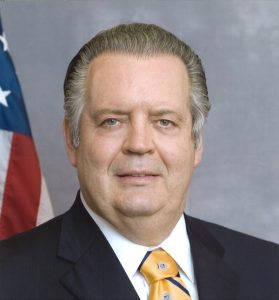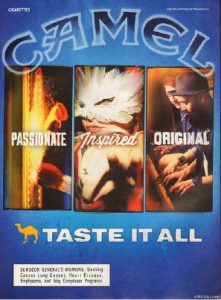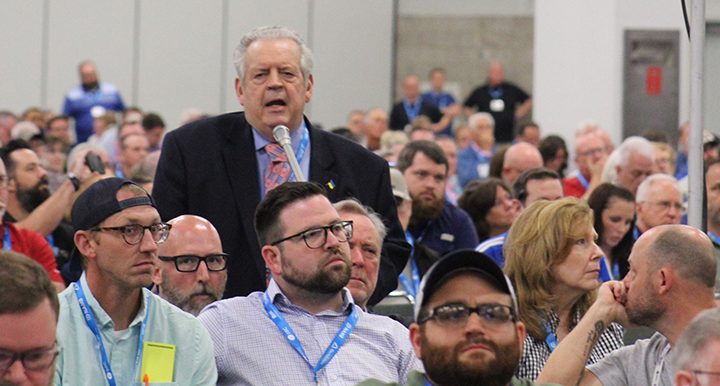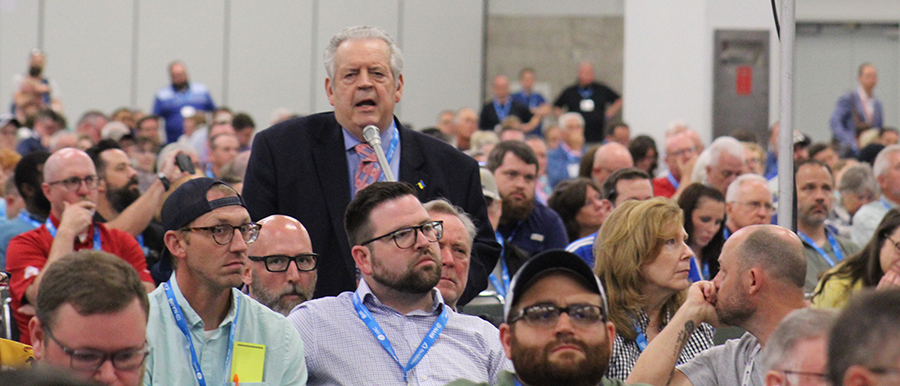“Christian nationalism” qualifies as a hot-button issue in our culture. From Baptist News Global to The Atlantic, articles proliferate about Christian nationalism. BGN has published at least 20 articles about Christian nationalism since January.
This is not one more article about Christian nationalism. This is about evangelicals attempting to deny their commitment to Christian nationalism.
For example, Richard Land insists he’s not a Christian nationalist. The former president of the Ethics and Religious Liberty Commission of the Southern Baptist Convention and currently president emeritus at Southern Evangelical Seminary, wants to set the record straight: “I’m not a Christian nationalist. I’ve read about some, but I don’t know any.”
He added: “I think it is a tactic by the Left and their toadies in the media to suppress patriotic beliefs and to suppress the idea that America is a unique country. They hate that, they don’t believe it themselves.”
“It is a tactic by the Left and their toadies in the media to suppress patriotic beliefs and to suppress the idea that America is a unique country.”
In Land’s imagination there are no Christian nationalists. It’s like arguing there are no Native Americans in our country. It’s like saying there’s no coffee at Starbucks.
Who is a Christian nationalist?
Land creates his own limited definition of Christian nationalism and then eliminates everyone he knows from his definition. He sounds like Michael Corleone claiming, “I am not a member of the mafia. My father is not mafia, my brother is not mafia, I don’t know any mafia.”
With his startling epistemological claim, I feel compelled to introduce Land to actual “Christian nationalists.” Prominent Christian leaders who support such fringe movements as Seven Mountains Dominionism include David Barton, James Dobson, John Hagee, Bill Johnson, Lance Wallnau, and Paula White. Notable politicians who have embraced it include Michele Bachmann, Sam Brownback, Marjorie Greene Taylor, Lauren Boebert, Ted Cruz, Newt Gingrich, Mike Huckabee, Charlie Kirk, Sarah Palin, and Rick Perry.
Land also breaks ranks with Al Mohler, a prominent leader in the SBC. Mohler recently said: “We have the left routinely speaking of me and of others as Christian nationalists, as if we’re supposed to be running from that. I’m not about to run from that.”
As Mohler indicates, in the present moment to be labeled a Christian nationalist is not a compliment. Thus Land, sounding as if someone had accused him of being a member of the ACLU, the Communist Party or Al Qaeda, denies any relationship with Christian nationalism.
“To be a patriotic American does not make you a Christian nationalist.”
“To be a patriotic American does not make you a Christian nationalist,” he said. “To believe God has played a unique role in our history, or that America is a unique nation, does not make us Christian nationalists. Pejoratively, they want to tie Christian nationalism to racism and to prejudice, and I reject those labels.”
I love evangelical arguments that consist of denials. Denial arguments are like chewing a piece of tough meat that grows larger in the mouth until it chokes you.
The Persuasion Model of denial
Land uses a particular argumentative framework that evangelicals routinely employ when attempting to avoid being shamed by what they believe is a secular culture. The communication theorist Hugh Rank’s Persuasion Model focuses on intensifying or downplaying the “good” or positive aspects of one’s product, cause or candidate, or to point out the negative points of the competition. The gimmick is to hide your own shortcomings and make the other guy look like a total devil.

Richard Land
This is an interesting irrational argument. The attempt to hide one’s evil by pointing to others with alleged greater evils is not an argument. It is a defense.
Land uses this model to make his argument. He downplays the meaning of Christian nationalism. He intensifies the wickedness of liberals, the values of patriotism, American exceptionalism and the American flag. He assumes if liberals would stop talking about “Christian nationalism” the entire concept would disappear.
His intensification gambit associates Christian nationalism with the most demonized group among evangelicals — the liberal left-wing. He seems to think if he could rid the nation of liberals, the rest of America, the God-fearing, Jesus-loving evangelicals, could go back to 1950 and live happily ever after.
The television ad man
Here’s a visual metaphor for understanding Land’s gimmick. Camel cigarettes once had a full-color, full-page magazine ad in red, white and blue to link smoking with being a good American. The ad intensifies the value of smoking, and it does so by using the strategy of association.
 Americans like to have fun, and America, fun and smoking are linked together in this ad with the phrase, “Taste it all.” The surgeon general’s warning about the fatal dangers of smoking is in the lower left part of the ad — known as the “dead space” — and it’s in small print. People only glance at this area or ignore it altogether.
Americans like to have fun, and America, fun and smoking are linked together in this ad with the phrase, “Taste it all.” The surgeon general’s warning about the fatal dangers of smoking is in the lower left part of the ad — known as the “dead space” — and it’s in small print. People only glance at this area or ignore it altogether.
Camel is selling passion, sexual desire, fun, music and America to hide the reality that smoking kills people. Land’s argument is a Camel ad. It deceives and hides a virulent and dangerous product: Christian nationalism.
Land has a built-in audience that already treats the scientific warnings about COVID and climate change as if they were the easily ignored warnings from the surgeon general.
Liberals are the enemy
His argumentative framework creates an enemy: left-wing liberals. Christian nationalism, in Land’s view, is a metaphorical construct, a rhetorical invention of liberals.
Again, he said: “I think it is a tactic by the left and their toadies in the media to suppress patriotic beliefs and to suppress the idea that America is a unique country.”
Land could not make a decent evangelical argument without including the media in his list of enemies. If the phrase “Christian nationalists” is a dirty seed planted in God’s garden, in Land’s view, the enemy that has done this wickedness is the liberal community and the media.
Promoting American exceptionalism
In what at first appears to be a less-conservative stance, Land disagrees with his friend Robert Jeffress of First Baptist Church of Dallas by saying he does not share the belief that America was founded as a “Christian nation.”
“I don’t believe we were founded as a Christian nation,” he said. “I believe we were founded by people who were Christians or were operating out of a Christian worldview.”
Instead, Land appeals to American exceptionalism, claiming America is “an experiment combining Judeo-Christian values with Enlightenment ideas.”
But that experiment “doesn’t work unless the majority of the people are aware of being subject to a higher authority,” he says.
“When people who are liberal try to label a Christian nationalist as anybody who believes America has anything to do with God or that God has anything to do with America, they’re denying most of American history,” Land argues.
American exceptionalism is a dominant trope of demagogues. It also is incipient Christian nationalism. Land’s vigorous defense of American exceptionalism puts the nail in the coffin of his denial of Christian nationalism.
He argues: “We are not (a) chosen nation, but America is exceptional, and God has blessed us in unique ways. We are the recipients of divine providence, divine blessing, and blessing, by definition, is undeserved. Otherwise, it would be called a reward.”
“American exceptionalism is the gateway to Christian nationalism.”
American exceptionalism is the gateway to Christian nationalism. It is a primary rhetorical trope of Christian nationalists. American exceptionalism offers a one-way relationship with God. God is to bless America because we are exceptional. We are not, on the other hand, required to be God’s servants to the rest of the world.
“America First’ is all that matters. American exceptionalism tends toward hubris and violence, not toward hospitality, generosity, servanthood and obligations to be a “good neighbor.” American exceptionalism smacks of self-righteousness.
Perhaps now we need the voice of a John the Baptist crying in the wilderness, “God can raise up children of America from these stones.”
Rodney W. Kennedy is a pastor in New York state and serves as a preaching instructor at Palmer Theological Seminary. He is the author of nine books, including the newly released The Immaculate Mistake, about how evangelical Christians gave birth to Donald Trump.
Related articles:
Americans United says Florida is inserting white Christian nationalism in the classroom
No, Rep. Boebert, the church is not supposed to ‘direct the government’ | Opinion by Michael Chancellor
Georgia representative says Christian nationalism actually is a good thing
Jeffress says he’s not a ‘Christian nationalist’ but America was founded as a ‘Christian nation’


